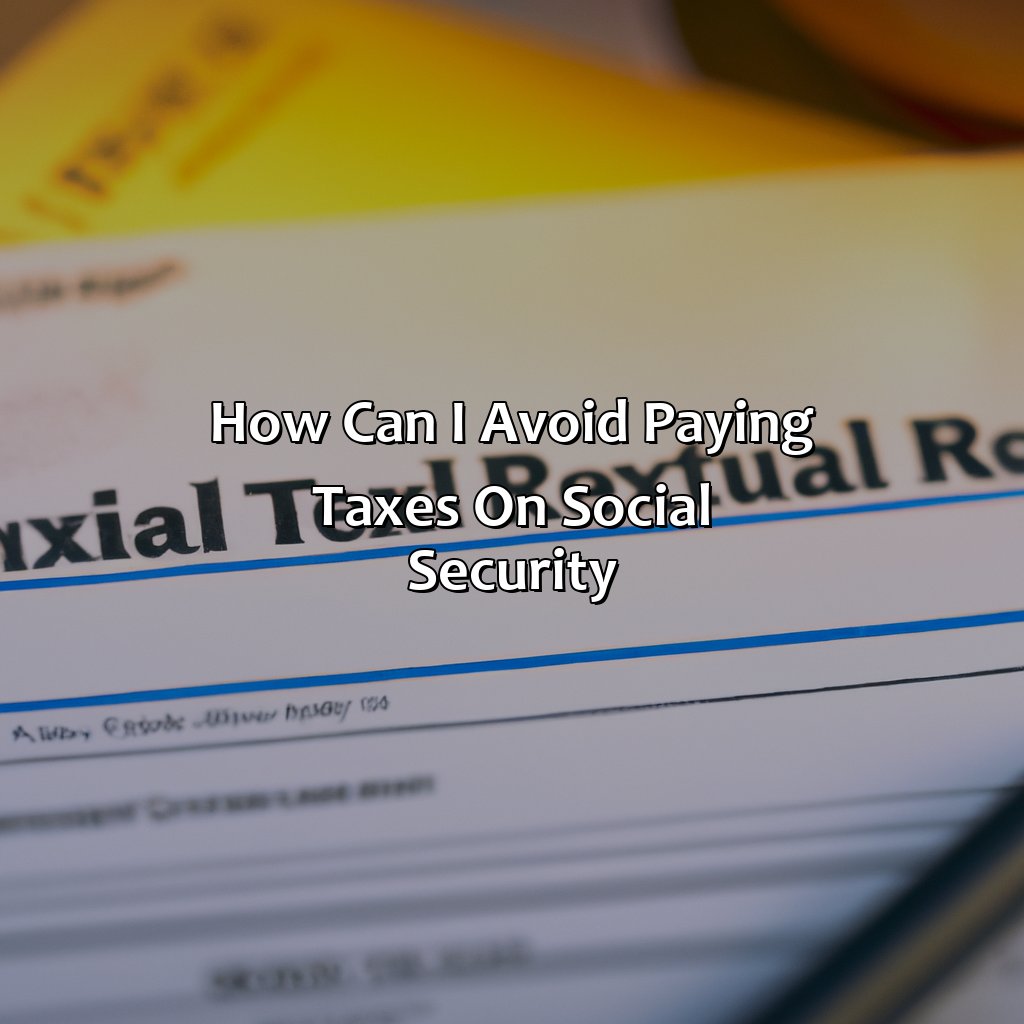How Can I Avoid Paying Taxes On Social Security?
Key Takeaway:
- Delaying Social Security Benefits can lower the amount of taxable income and reduce the tax burden on social security benefits.
- Managing other sources of income can reduce the taxable income and lower or even eliminate the tax on social security benefits. This can be achieved through careful planning and investment strategies.
- Consider moving to a tax-friendly state or country to reduce the tax burden on social security payments. Retirement destinations like Florida and Texas offer great tax benefits.
- Investing in tax-free investments like municipal bonds, Roth IRA, and Health Savings Accounts (HSA) can lower the taxable income and reduce the tax burden on social security benefits.
- Strategic withdrawals from retirement accounts like 401(k), IRA, and Roth IRA can help reduce the taxable income and lower the tax burden on social security payments. Consult a financial advisor before making any investment decisions.
Have you ever wondered how to handle social security taxes and get the most out of your retirement income? With this guide, you’ll learn how to reduce your tax burden and keep more of your hard-earned money.
Ways to Avoid Paying Taxes on Social Security
Want to dodge taxes on your social security? There’s a few ways:
- Delay benefits
- Manage other income sources
- Move to a tax-friendly state
- Invest in tax-free investments
- Make strategic withdrawals from retirement accounts
Check the sub-sections for more info!

Image credits: retiregenz.com by Yuval Jones
Delaying Social Security Benefits
Delaying your retirement benefits could reduce your taxable income and ensure you receive larger payments in future. You can begin collecting retirement benefits when you reach 62 years old, but waiting until your full retirement age increases the monthly payment amount. For those born after 1943, the full retirement age ranges from 66 to 67 years old depending on the year of birth.
By delaying the collection until you reach the age of 70, your benefit amount could increase by up to 8% every year. This way, you won’t have to worry about paying taxes on a substantial sum right away and instead allow it to grow towards maximum potential.
Incorporating investment strategies alongside delayed collection of benefits can maximize returns for long-term security.
Pro Tip: Understand the various tax deductions and credits provided by government programs such as Income-adjusted Medicare premiums or charitable contribution deductions.
With the right management, you can have other sources of income and still dodge Uncle Sam’s tax game – just don’t let him catch you.
Managing other Sources of Income
When it comes to managing additional income, careful consideration is key. One method to lessen the burden of taxes on Social Security is to manage other sources of income effectively. This approach involves making smart decisions around investment opportunities, pension payouts, and IRA withdrawals.
Making wise investment choices can lead to reduced taxable income overall. For example, investing in tax-free municipal bonds can limit the amount of taxes owed each year. Additionally, carefully timing investments or delaying pension payouts could help minimize income in a given year.
Another option is to manage retirement account withdrawals in a way that limits taxable income. This might involve making smaller withdrawals from traditional IRAs earlier on in retirement while delaying withdrawals from Roth accounts until later.
To avoid paying taxes on Social Security benefits, it’s important to consider all sources of income and make informed choices that minimize taxable amounts. Above all, seeking guidance and advice from financial professionals may be the most beneficial step towards making effective decisions for your unique financial situation.
Goodbye sunny beaches, hello tax breaks: why retire in paradise when you can retire in Florida?
Consider Moving to a Tax-Friendly State
One strategy to reduce taxes on social security is relocating to a state with friendly tax laws. You may benefit from lower state income, property and sales taxes by making this move. Before packing your bags, research the targeted state’s tax policies for social security income. It’s necessary to consider additional factors such as cost of living, housing, and accessibility to healthcare.
Additionally, if you are still working in a state that charges high-income taxes, it might be idealistic to move after retirement. For instance, if you decide to retire in Texas where there are no individual income taxes, then it’s advisable to reside there for the majority of the year. This enhances your feasibility for enjoying lesser or no taxes on social security.
Florida is one great example as it doesn’t charge personal income tax and separates retirees from levies on other retirement revenue. With these benefits favoring locals in their retirement age combined with the sunny weather and sandy beaches, Florida remains a popular retiree destination.
Seniors over 65 can escape any real estate taxes up-to $25000 per year imposed by local authorities in Illinois through its senior citizen assessment freeze program. This could be an excellent opportunity for future residents as long they fulfill specific eligibility needs.
Sources have revealed that approximately 115 million taxpayers owed zero federal individual income tax liability last year with substantial help from refundable credits like Child Tax Credit and Earned Income Tax Credit amounts according to preliminary data published by the IRS. Investing in tax-free options is like having your cake and not paying taxes on it too.
Tax-Free Investments
One way to reduce taxes on your Social Security income is by investing in assets that are tax-free. These may include municipal bonds, Roth IRA accounts, and health savings accounts.
Municipal bonds are debt securities issued by state and local governments to fund public projects. The interest earned on these bonds is exempt from federal, state, and local taxes, making them attractive for retirees seeking tax-free income.
Another option is to invest in a Roth IRA account, which allows you to contribute after-tax dollars into the account, and withdraw them tax-free during retirement. Additionally, if you’re over 55 years old or disabled, you can make penalty-free withdrawals from your traditional IRA to pay for health care expenses.
Retire early and avoid taxes? Sounds like a strategic withdrawal to me.
Strategic Withdrawals from Retirement Accounts
One effective tactic to reduce taxes on retirement withdrawals is the use of well-planned distributions from your accounts. By skillful allocation of your withdrawals between taxable and non-taxable accounts, you can potentially minimize the amount of taxes owed on Social Security benefits. These strategic withdrawals aim to reduce your overall tax bracket and thereby decrease taxes payable on your social security income.
Moreover, you could consider Roth IRA conversions. Converting to a Roth account may raise your current tax liability since you’ll need to pay the converted amount’s income tax upfront. However, doing so will give you additional funds that are eligible for nontaxable withdrawals in retirement, reducing taxable distributions and limiting any potential taxation on Social Security benefits.
A lesser-known strategy is using Health Savings Accounts (HSAs) as a retirement savings tool. HSAs offer triple tax benefits: contributions are tax-deductible, it grows tax-free, and withdrawals are also not subject to income tax when used for qualified medical expenses. Therefore, by maximizing HSA contributions before retirement and maintaining a healthy lifestyle throughout life could result in a considerable cushion of untaxed funds drawn down from this account during retirement.
Pro Tip: Careful planning is essential when executing these strategies since errors could lead to severe penalties or even court cases. Consult with an experienced financial advisor or CPA before implementing these plans to ensure compliance with all laws and regulations related to taxation in retirement.
Some Facts About How To Avoid Paying Taxes On Social Security:
Social Security benefits are generally not taxable if your income is below certain limits. (Source: AARP)
Working in retirement can result in a portion of your Social Security benefits being taxed. (Source: Forbes)
Contributing to a Roth IRA can help you avoid taxes on your Social Security benefits. (Source: The Balance)
Moving to a state with no income tax can also help you avoid paying taxes on your Social Security benefits. (Source: Kiplinger)
Consulting with a financial advisor or tax professional can help you develop a plan to minimize taxes on your Social Security benefits. (Source: U.S. News & World Report)
FAQs about How Can I Avoid Paying Taxes On Social Security?
1. How can I avoid paying taxes on Social Security?
One way to avoid paying taxes on Social Security is to keep your total income below the threshold amount. For single filers, the threshold is $25,000, and for married couples filing jointly, it’s $32,000. You can also consider converting traditional IRA accounts to Roth IRA accounts, as withdrawals from a Roth IRA are tax-free.
2. Can I deduct Social Security benefits on my taxes?
If you receive Social Security benefits, you may have to pay taxes on a portion of your benefits. However, you may be able to deduct a portion of your Social Security benefits on your tax return if you have significant medical expenses or if you have income from a pension or traditional IRA.
3. Is it legal to avoid paying taxes on Social Security?
Avoiding taxes on Social Security benefits is legal as long as you follow the tax laws and regulations. However, evading taxes by intentionally hiding income or providing false information is illegal and can result in fines and even criminal charges.
4. Do I have to pay state taxes on Social Security benefits?
Not all states tax Social Security benefits. If you live in one of the states that do tax Social Security benefits, you may be able to qualify for exemptions or deductions to lower your tax bill.
5. If I work after I start receiving Social Security benefits, will I have to pay taxes on my benefits?
If you work after you start receiving Social Security benefits, your benefits may be taxable depending on your total income for the year. You can use the Social Security Benefits Calculator on the IRS website to estimate your taxes.
6. Can I hire a tax professional to help me avoid paying taxes on Social Security benefits?
Yes, you can hire a tax professional to help you minimize your tax liability and avoid paying unnecessary taxes on your Social Security benefits. They can advise you on tax planning strategies and determine if you qualify for any deductions or exemptions.
 Checkout this IRS Loophole
Checkout this IRS Loophole 
